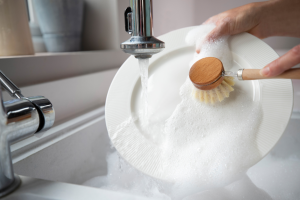The Relationship Between Hard Water and Soap Suds: A Pentair Water Softening Company in Algonquin, Illinois Explains

When it’s time to clean your hands or dishes in your kitchen sink, the presence of soap suds is imperative. Without adequate soap suds, you’re left with nothing but a smooth lather. Simply put, this isn’t enough to clean things thoroughly.
Unfortunately, hard water tends to prevent the production of soap suds. However, there is something you can do to combat that problem: you can install a water softener.
Are you wondering how a water softener can improve your ability to produce soap suds? This Pentair water softening company in Algonquin, Illinois is going to explain below.
What Effect Does Hard Water Have on Soap Suds?
Simply put, hard water impairs the production of soap suds. More specifically, the minerals in hard water make it difficult for the typical chemical reaction between soap and water to occur. This is because certain minerals (calcium and magnesium) get in the middle of the chemical reaction, greatly inhibiting it.
What this means is that, to facilitate a full chemical reaction, you’ll have to eliminate these minerals. Without calcium and magnesium present, the chemical reaction will occur at full force, resulting in the most suds possible.
How do you remove calcium and magnesium from your water? With the use of a water softener. The water softener will remove the two minerals from the water supply, ensuring that you always have an adequate number of soap suds for cleaning purposes.
If you’re interested in installing a water softener for the purpose of creating more soap suds, do not hesitate to get in touch with your Pentair water softening company in Algonquin, Illinois. They’ll not only supply you with a high quality water softener, but they can install it for you as well.
How Does the Water Softener Eliminate Calcium and Magnesium?
Does the water softener seem too good to be true? Does it really eliminate all the calcium and magnesium in a water supply? Yes, it does.
Water softeners utilize a scientific process known as ion exchange. This is when positively charged ions are swapped with negatively charged ions. Specifically, in the case of the water softener, sodium ions are swapped with magnesium and calcium ions.
How exactly does the water softener facilitate this? With the help of resin beads. These sit in the water softener’s water tank and are covered in sodium ions. When water flows through the water softener, the sodium ions leave these beads, thereby creating space for the magnesium and calcium in the water. These cling onto the beads before the water leaves the softener.
As a result, by the time the water has exited the water softener, it’s entirely void of calcium and magnesium particles, and contains just small amounts of sodium. The amount of sodium is so small that it has no noticeable effect on the water’s quality.
Because the water is no longer containing calcium and magnesium, it allows the full chemical reaction between soap and water to occur. This results in optimal soap suds and the greatest cleaning capabilities possible.
To keep the system running, your water softening company in Algonquin, Illinois will recommend adding softener salt to it every one to two months. Do this, and you’ll have an ample supply of soap suds from there on out.
Looking for a Pentair Water Softening Company in Algonquin, Illinois?
Want to be able to produce more soap suds in your home? If so, Johnson Water Conditioning is the company to call. As the top-rated Pentair water softening company in Algonquin, Illinois, we can help you choose and install the right system for your home, allowing you to produce soap suds with ease.
Contact us today to discuss your options.

 Better Water for
a Better Life
Better Water for
a Better Life
